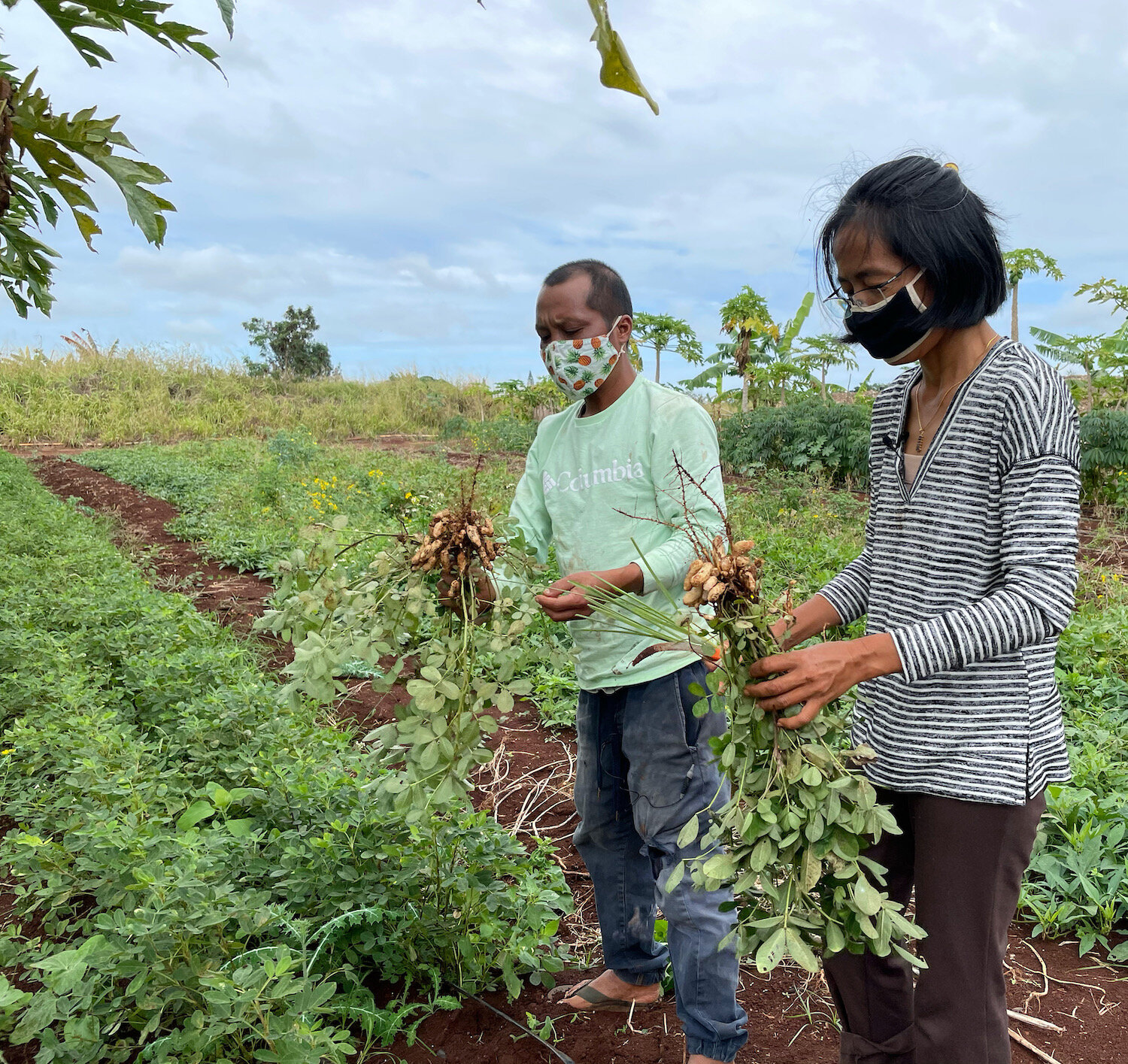Try, Adapt, Grow: A Lifetime of Learning at Mingalar Farm
Written & Photographed by Sarah Burchard
Videography by Reel World Filmmakers
Lemongrass – the citrusy heb integral to Southeast Asian cuisines – flourishes in Hawaiʻi. It loves the tropical climate and hot sun.
If you were to put a few bulbs of it in a jar of water and set it on your kitchen counter it would eventually begin to grow roots. Bury those roots outside in the ground and you will have a large patch of long, sharp, green leaves bursting from the soil begging to be sliced, smashed, or steeped into bubbling curries, hot soups, and teas.
Thereʻs something mystical about stepping on to someone’s farm for the first time.
Like entering a secret garden, a portal to the raw truths about nature and how a particular farmer manages it. Farms are often private sanctuaries, a part of someoneʻs life that only they get to enjoy.
Mingalar Farm was unexpected. We did not know that we would be arriving to peanut fields and betel nut trees, or a 40-year-old tortoise who likes to snack on green papaya. We did not know that if you split open the trunk of a banana tree you can pull out an ivory colored shoot that tastes like hearts of palm. We did not imagine we would meet a Burmese woman with a resume like an ambassador’s or meet a man of Mon heritage – an indigenous ethnic group from Mon State, Myanmar that has their own language, traditions, and cuisine.
Mike Thinn holding a banana stem
Mingalar Farm is operated by Saw Thinn and Aung Naing Htoo – who goes by Mike here in the United States. This husband and wife team introduced us to Mon culture and their remarkable life story by way of those ivory colored shoots – which they call, banana stems.
Our primer began with Mike taking a hatchet to a banana tree on his farm and ended in the kitchen learning a traditional Mon dish composed of sliced raw banana stems, tamarind, fish sauce, and turmeric-infused fried shallot and garlic. In between chopping and slicing, Saw revealed how she has practically become the poster child for the Pacific Gateway Center’s mission.
Although Mike and Saw are both from Myanmar, they could not of lived more different lives.
Mike grew up in Mon State, located in the southern part of Myanmar, just east of Thailand. His dad was a government official and his family owned a small restaurant run by his mother, with the help of Mike.
In 1988, during the uprising, Mike and his family fled Myanmar for Thailand. He was 17-years-old.
Saw, whose name translates to “famous” in Burmese, is from Mandalay – the second largest city after Yangon (formerly Rangoon) – located in central Myanmar, and came from a family that chose to stay.
“In 1988, some students, you know they have some kind of uprising,” Saw said. “They just do something like demonstrations, or strikes, or something like that. They are afraid that they will be arrested so that’s why they migrate to neighboring countries. … For us, for me, personally, we don’t do any strike, we just stay at home. … Our parents just let us, you know, “With the 70s going on you girls stay at home. This is it,” that kind of thing. And then we are not too much interested something like politics right?”
For someone raised to not have any interest in politics, Saw certainly went on to dedicate herself to bettering the lives of the people around her. She began her career teaching English – tutoring students in a medical university – and volunteering on the weekends working with underprivileged kids, longing to work in the nonprofit world.
Freshly harvested peanuts
Meanwhile Mike and his family settled into a refugee camp in Thailand and he got a job working construction. With the help of his aunt and uncle they applied for U.S. citizenship and in 2000 immigrated to Philadelphia. Mike started out working in a car factory, but eventually returned to his first profession: cooking. In 2006, after several years working in a sushi restaurant in Philly, Mike moved to Oʻahu and started rolling sushi for Advanced Fresh Concepts Franchise Corporation (AFC).
The following year Saw had the opportunity to come to Oʻahu to join the Asia-Pacific Leadership Program fellowship at the East-West Center. During this time she interned at the Pacific Gateway Center helping immigrant and low-income families become self-sufficient on Oʻahu. This experience enabled her to return to her country one year later and start working for the United Nations International Children's Emergency Fund (UNICEF).
Thai bananas
But, Saw was hungry for more. She applied for a student visa at Hawaiʻi Pacific University and returned to Oʻahu to earn her masterʻs degree in Global Leadership and sustainable development.
“My country Myanmar is an agricultural country,” Saw said. “Food is also our main lifesource, so that’s why after doing some preliminary research … I realize that, OK, Iʻll focus on sustainable agriculture.”
At the time Saw had no idea she would end up working on a farm. Her research investigated the relationship between adult literacy rates of the population in agricultural countries and how their agricultural resources were managed, so that safe environmental conditions and sustainable agricultural standards could be met. She understood that an illiterate farmer who can’t comprehend the fine print of contracts or agreements is bound to be taken advantage of.
Saw attended a Burmese social gathering one evening and was introduced to Mike.
A year later they were married and a year after that they started their first business together – an AFC sushi franchise of their own, which they operated together for three years while Saw simultaneously worked at the East-West Center.
Saw graduated from HPU in 2012, which meant her student visa had now expired. She had to return to Myanmar and leave Mike behind.
She returned to her country and got a job working as a project coordinator for the Sustainable Development Knowledge Network while she applied for U.S. permanent residency status.
Baby soursop
Three years later she officially immigrated to Oʻahu, reunited with her husband, and had a child. Mike was cooking and Saw got her job back at the East-West Center, where she continues to be a program assistant helping to manage their leadership programs to this day. To help make ends meet she worked weekends at Ala Moana Mall.
Mike and Saw wanted to start another business together, but without the capitol they were not sure how, until they heard about the Pacific Gateway Center’s farming opportunity.
“I never imagined that I would be a farmer in Hawaiʻi some day,” Saw laughed.
Mike and Saw Thinn demonstrating Banana Stem Salad at Pacific Gateway Center
But, quitting their weekend jobs to start a farm would allow them to bring their son to work with them.
“Five days and full-time … and then Saturday, Sunday evening I’m still doing the second job,” Saw said. “It does not work out. But if we do the farming the good thing is that we can bring the kid to the farm so he can … play around. … The work schedule is also very flexible. We can work in the evening, we can work Saturday and Sunday. You know, if we are tired, we don’t need to come to work. If we still have more time we can come and do so. Time management is really good to be a farmer.”
Betel nut palm
In 2016, Mike and Saw started Mingalar (Burmese for auspiciousness) Farm. They were the very first farmers to lease land from Pacific Gateway Center.
“If you have a passion to be a farmer, if you don’t have the land, if you don’t have the water, you cannot do anything,” said Saw. “Pacific Gateway Center … give us the opportunity to, you know, if you really have a passion, you know, this is the land you start to grow. This is the water, you can use it. And then, another thing is that some of the machinery … until now we don’t have the machinery. We are just using the Pacific Gateway Center tractor to till the soil. So, these are the things that Pacific Gateway Center is just like helping. … Just like kinda beginner farmers, that try our dreams to be a farmer.”
The encouragement they received from the Pacific Gateway Center gave them inspiration to try something new, the confidence that they could succeed, and the energy to keep them moving forward.
They also received support from the United States Department of Agriculture (USDA), which taught them how to get a loan, care for the soil, and conserve water.
Fellow local farmers generously shared their knowledge too.
“My former mentor, Christian from Kahumana Cafe. We also really grateful … because we learn. We learn from everybody … They give us the feedback of what we should do next,” Saw said, inspecting a tree for brown leaves to pull.
jicama, too overgrown to sell
For the first two years they lost money and crops trying to farm organically. It was simply too tough with their inexperience.
“Another challenge is that all the farmers, the neighboring farmers, they are not organic, so the pests are coming in,” Saw said. “We try to adjust the situation … we trying to adjust the chemical and pesticides. I tell myself that we can. And even the fertilizer, we just only use the chicken manure, another one is the bone and meat meal, these are recycled things we can get from the island.”
Now, in their fourth year, Mingalar Farm is finally starting to come around. Each day begins with watering seedlings and checking on irrigation. Since their farm is located at the end of the water line there are times when the other farms have used so much water, that there is none left for them.
“The pressure is really low in our side,” Saw said, explaining that when this happens someone at the Pacific Gateway Center will come out to help them access water.
In addition to water, weeds are a constant battle and the hardest part of their job.
“Farming is the lifelong learning,” Saw said. “No farmer gets success in every growing. We must try and then we must adapt and then we must learn something. And gradually, you will be … a “professional” gardener.”
Like planting the jar of lemongrass on your windowsill that has started to sprout roots, Mike and Saw buried the culmination of their lives into the soil at Mingalar Farm, and The Pacific Gateway Center provided the water and nourishment needed. As a result, Mingalar Farm is expanding. They are currently prepping a second plot of land just down the road, where they will plant new seeds and the cycle of their life will continue.
MIngalar Farm is located in the Pacific Gateway Center Farms in Kunia on Oʻahu. Their produce is sold wholesale to markets in Chinatown. You can inquire by contacting the Pacific Gateway Center: (808) 851-7000 or info@pacificgatewaycenter.org.

















